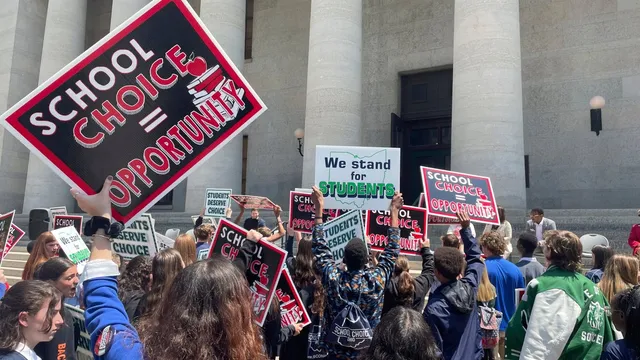
Ohio court rules private school vouchers unconstitutional
2025-06-26 00:00- A coalition of public school districts and advocacy groups successfully challenged Ohio's EdChoice program, claiming it leads to segregation and inadequate public school funding.
- Judge Jaiza Page ruled that the program violates the Ohio Constitution's requirement for an efficient public school system.
- The state plans to appeal the ruling, indicating that further legal challenges to the school voucher program are expected.
Express your sentiment!
Insights
In a recent ruling, Franklin County Common Pleas Judge Jaiza Page found Ohio's private school voucher system unconstitutional, siding with a coalition of public school districts and advocacy groups. The case, driven by the lawsuit Vouchers Hurt Ohio, highlighted concerns that the EdChoice program led to resegregation and unfair funding disparities. Page's decision, which was issued on June 24, 2025, confirmed that the program violated the Ohio Constitution by failing to ensure a thorough and efficient system of public schools. The ruling was met with varied reactions, with public education advocates celebrating the win while critics raised concerns about potential impacts on students. The EdChoice program, launched in 2005, was originally designed to provide assistance to students in low-achieving schools but eventually transformed into a broader universal voucher system. While the judge dismissed claims that the program violated the equal protection clause, she underscored that control over student admissions rests with private institutions, thus rejecting the argument that parents have the ultimate decision-making power. This ruling also followed historical precedence, particularly referencing the landmark Simmons-Harris v. Goff case which dealt with similar issues regarding funding and school systems in Ohio. The Ohio Christian Education Network, a prominent organization advocating for school choice, criticized the ruling, suggesting it could deprive many students of their chosen educational paths. They framed the decision as poorly reasoned and highlighted past legal rulings that supported school choice at both state and federal levels. Meanwhile, the Ohio Education Association expressed that the outcome is a significant milestone for public education in Ohio. With the state signaling its intent to appeal the ruling, further legal battles are anticipated, which are likely to shape the future landscape of educational funding and school choice in Ohio for years to come. The decision raises critical questions about the boundaries of taxpayer-funded programs, reinforcing ongoing national debates regarding school vouchers and public versus private education funding.
Contexts
The impact of voucher systems on public education is a complex and multifaceted topic that has sparked considerable debate among educators, policymakers, and the public. Voucher systems, which provide families with financial assistance to enroll their children in private schools rather than public institutions, aim to enhance educational choice and improve student outcomes. Proponents argue that these systems foster competition among schools, encouraging them to improve their programs to attract students. They contend that parents should have the right to choose the best educational setting for their children, and that underserved populations can benefit significantly from increased access to higher-quality education options, potentially reducing achievement gaps in disadvantaged communities. Critics, however, raise concerns about the potential negative effects on public education funding and quality. By diverting public funds to private institutions, voucher systems may exacerbate inequalities in the education sector, as public schools often serve a greater proportion of low-income and minority students who rely on these resources. This displacement of funds could lead to decreased resources and support for public schools, which remain crucial for the majority of students. Furthermore, the lack of accountability and regulation in some private schools raises questions about the quality of education they provide, including issues related to curriculum standards and teacher qualifications. Critics argue that an increased focus on privatization can undermine the collective responsibilities that public education holds to ensure equitable access for all students. Research on the effectiveness of voucher systems has produced mixed results. Some studies indicate that students using vouchers may experience modest academic improvements, particularly in urban settings where school options are limited. However, other research highlights potential adverse outcomes, including declines in student performance in public schools that lose funding due to voucher programs. Thus, the results of implementing voucher systems often vary significantly by region, socioeconomic status, and the structure of the voucher program itself. This inconsistency poses challenges for policymakers seeking to evaluate the overall success of such programs and consider their implications for public education as a whole. In conclusion, the impact of voucher systems on public education remains a contentious issue that necessitates careful consideration of the diverse evidence available. Policymakers must weigh the goals of enhancing educational choice and competition against the potential risks to public education's stability and equity. As communities and educational landscapes continue to evolve, ongoing research is essential to inform effective decision-making and ensure that the interests of all students are prioritized in the pursuit of quality education.